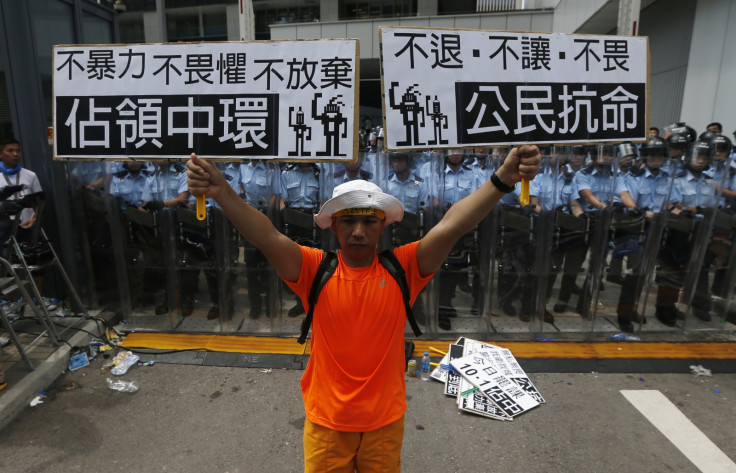Hong Kong Protests Drag Hang Seng Down 2%

The Occupy Central protests in Hong Kong have dragged down the city state's main stock index, as the political movement demanding 'civic nomination' is expected to hit the financial, tourism and retail sectors of the China-administered region.
The Hang Seng Index is trading down 2.20% at 23,158 as at 7:37 am GMT. Meanwhile, the Shanghai composite index is unaffected by the protests, edging up 0.17% to 2,351.68.
The protesters are demanding that China withdraw its proposal to implement political reforms in the former British colony. A few weeks ago, China's National People's Congress decided that election candidates will be nominated by a committee of 1,200 people.
The Occupy Central campaign, led by Benny Tai who is a law professor at University of Hong Kong, demands 'civic nomination' when universal suffrage is allowed in the Chief Executive election 2017.
The protests continue to swell in the streets of Hong Kong on 29 September as more and more pro-democracy campaigners defy tear gas fired by the riot police.
Shopping areas like Causeway Bay in Hong Kong Island and Mongkok in Kowloon also see hundreds of people gathering. Several large banks have said they will be suspending operations in Hong Kong.
"As the protests break out during the week of China's Golden Week and now spread to shopping areas frequently visited by tourists, Hong Kong's retail sales will suffer if the protest continues to drag on," said Louis Lam, economist at ANZ Bank.
Lam added that the Golden Week sales will likely contract this year.
Consumer goods group Want Want China Holdings has been the top loser in Hong Kong, with its shares falling 4.5%.
The campaign is expected to intensify further over the next few days as Hong Kong will have two public holidays falling on 1 and 2 of October. More supporters will likely join the campaign later this week, impacting ground transportation.
Lam added that Hong Kong's economic competitiveness is a real concern given the current situation.
"Delaying infrastructure development will dampen the city's economic competitiveness. Headlines like 'HK will be taken over by Shanghai' or 'China will no longer use HK as a test bed for reform' will appear more frequently," he said.
"As China's onshore market is increasingly liberalised, Hong Kong will start to lose its unique advantage as a gateway to China market. There is a need for the city to speed up and strengthen its economic and market infrastructure promptly."
© Copyright IBTimes 2025. All rights reserved.






















